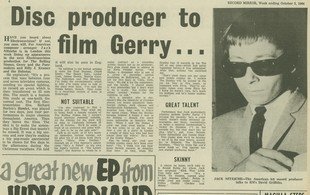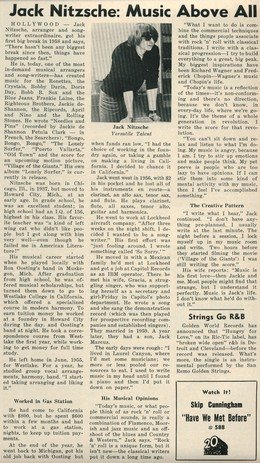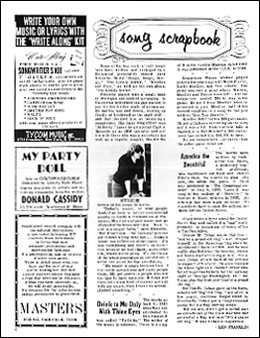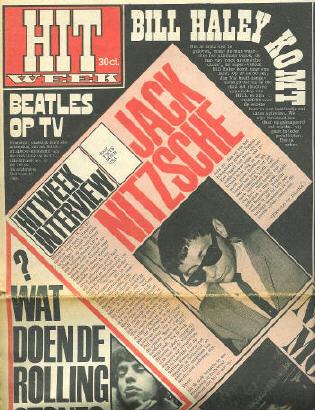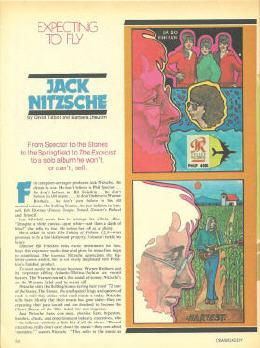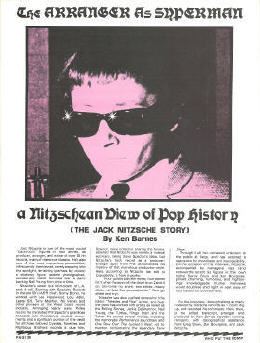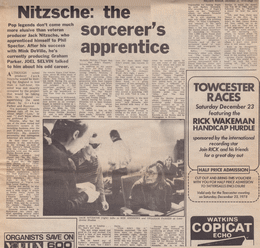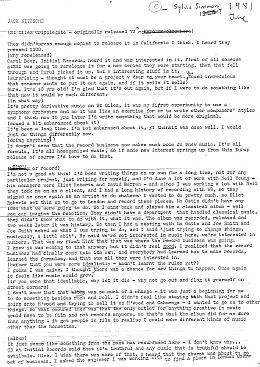| Record Mirror | Record World | Songwriter's Review | HITWEEK | CRAWDADDY | BOMP! |
| Melody Maker | Sylvie Simmons | MOJO | Wire | Otono Cheyenne | RUTA 66 |
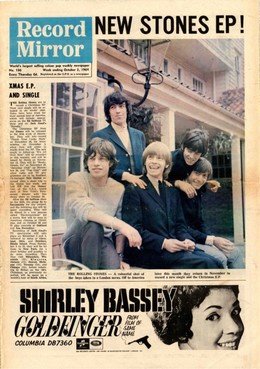
What do you know, another 'first-ever' Jack Nitzsche interview?! Kinda fitting that the present holder of this 'first-ever' accolade is a British magazine. The Brits, up to the present day, have consistently harboured a deep respect and sometimes perhaps a fanatical interest in the folk who worked behind the main names on the record labels.
Hard to believe now but Record Mirror was one of four weekly newspapers that blossomed in the 60s to help feed the British publics desire for pop news, reviews, charts and interviews. Neither as long established as Melody Maker or as 'cool' as the New Musical Express, nevertheless along with Disc and Music Echo they all enjoyed healthy sales. The interview by David Griffiths was apparently conducted whilst Jack was in England to chat to the Brit groups already signed to appear in the as yet unnamed TAMI Show. He was also searching for a female version of the Rolling Stones to fill out the bill. As good as some of the records by the Breakaways, Vernon Girls, Orchids and others were, he not surprisingly, failed to find one with the balls of the Stones! By the nature of the beast the interview is a bit short, tantalising subjects such as Jacks comments on Jackie DeShannon, Round Robin, Bobby Darin and The Righteous Brothers aren't fully developed. Still where else have you read that Jack was admirer of Sandie Shaw or that Hal Blaine got Jack his first 'big' break in the movies? A short interview but give it a read by clicking on the "Disc producer to film Gerry..." scan.
The magazine scans were kindly supplied 'From the Rob Weingartner Collection'.
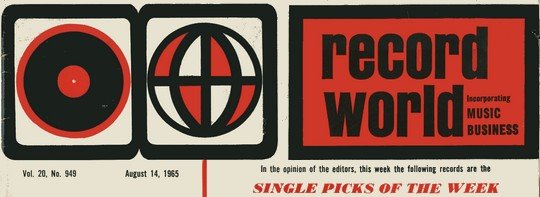
Aaahh, so this is where Songwriter's Review (there article is below) 'borrowed' the photo of, the quotes and life story, thus far of Jack Nitzsche. If that piece left you wanting more then Record World's almost full page feature should go a long way to satisfy your craving. Thanks to long time pal Harry Young for forwarding the scans which I'm thrilled to re-present for the first time in almost 50 years.
The piece is a detailed overview of Jack's early struggles to get established and earn a living in the record biz, his success's up to the release of "Village Of The Giants" and his "The Lonely Surfer" album, how he viewed the music of the day and the anger that drove him to get a reaction from people to his recordings. If this isn't enough there is even a quote from his wife Gracia; "Music is his first love-then Jackie and me. Most people might find that strange, but I understand it perfectly. Music is Jack's life. I don't know what he'd do with-out it."
First published in 1946 as "Music Vendor" it had changed its title to "Record World" a year before this feature. Perhaps not so well known now as its competitors Billboard and Cashbox its popularity over the decades sometimes equaled and surpassed that of its rivals. The printing presses shuddered to a halt in 1982.
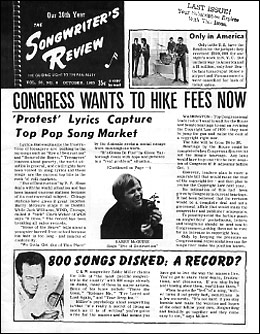
First printed in 1946, "SONGWRITER'S REVIEW" was still being published 30 years later. Concerned with the songs' writers more than the latest teenybopper sensations that recorded them, it had a profitable sideline in 'vanity ads' proliferated to attract any budding Rogers & Hart or Goffin & King.
Among the adverts on the "Song Scrapbook" page there's a super interview with Jack. It's short, only a few paragraphs, but sheds further light on Jack's beginnings in the music biz, including his first meeting with his future wife Gracia.
I made the confident boast that HITWEEK's interview was Jack's first. Pleased to see I was wrong. Click on the 'Song Scrapbook' page to read the interview and checkout the look that, ten years later, so influenced the Ramones!
Phil Milstein, curator of the American Song-Poem Music Archives discovered this interview whilst conducting research, I'm grateful for his thoughtfulness in passing on the information and making the scans available for this site.
At the time of this interview, Jack was 29 years old. He had long ago finished his apprenticeship to Sonny Bono, H.B. Barnum and others. Since 1961/62 he had been creating his own unique aural treats. By 1966, he was already at the top of his game, and was a major player in shaping the sound of The Rolling Stones. His arranging for Phil Spector had given him a share in an unprecedented run of hits. He had composed a film score, had his own Top Forty hit and three solo LPs. He'd put the 'sound' and some of the acts together for The T.A.M.I. Show and he'd achieved hits for others, as arranger and producer, working for a myriad of known and unknown artists and for labels big and small. It's not hard to imagine how his skills would have been reported in the MTV, Smash Hits days of today. Yet at the time, as far as I can ascertain, this was his first interview. And where was it printed? Not in Time or Life but an obscure Dutch 'Pop' magazine, HITWEEK.
How much of this was due to reluctance from Jack Nitzsche to be interviewed or lack of interest from the media of the day, I'm not sure. I'd guess a bit of both. Certainly the aims and ideals of HITWEEK would have appealed to him, and his pal Phil Spector had also been interviewed by Frits Boer for the same music paper.
The interview itself does offer some fascinating glimpses
into Jack's feelings about the music business and his view of artists.
The questions and comments passed are some way from the style of 'Song
Hits', although an endearing description of him is given: "A boy with
hair like a medieval page, a little bit curved in the back, in a beautiful
green velvet jacket. Between the hair and the jacket a friendly head,
with two intelligent eyes behind a pair of glasses."
Cool, eh?
The interview would not be available without the translation
skills of Wendy Bouter and J.H. Ket. The latter also contributed
excellent background information on the history of HITWEEK, which
has been added as 'notes' at the end of the interview.
Thanks to Wendy and Hans.
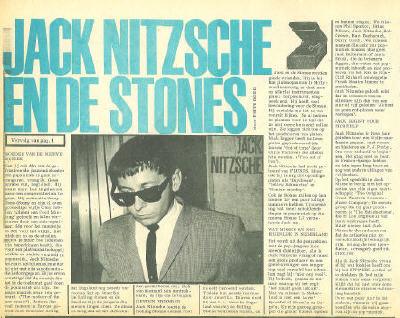
P.S. by Denny Bruce.
I met Jack soon after the Dutch piece. There is an error in the story; he moved to Spain with his wife, Gracia, and Steve "Teenage" Douglas, not P.J. Proby. They didn't stay too long in Barcelona - they didn't like the "gringo" with the funny haircut. So back to L.A.
Jack mentioned "The Original Great Western Gramophone Company" as his new label. He "loved" doing the Spector sessions, because it was a team. He felt the same way with the Stones; with Andrew Loog Oldham they were a team.
What I was trying to say about Lou Christie, and other
artists he was hired to arrange for and produce, was that he just felt
like he was doing a job, "Like pumping gas, or being a stock boy in a
supermarket".
The magic of the hits was in the chemistry created in
the studio when he was in a unique environment with talented people "pressing
the envelope"
. Once you have success, it makes everyone
happier and you have fun being together and making hits. That's the vibe
he wanted for his label.
He had hired Wes Wilson, who did many of the early San Francisco psychedelic gig posters, to design his label's logo, letterhead, etc. He was in negotiations with the Great Society, a band led by Grace Slick and her husband, Jerry. I was in a band that Jack was going to sign in 1966, and we really hit it off and became best friends. (My group is explained in the Rhino liner notes.)
He was dealing with ABC Records, who were not real hip.
They made a deal with Dunhill (with Lou Adler). Jack was dealing directly
with the president, Jay Laskey, who came from a strictly business background.
They were having difficulty putting the deal in contract form, as Jack
wanted "artistic control" and to be fair with the acts. One day Jay literally
threw him out of the office and told him "all you artistic assholes are
all the same"
.
End of the Jack Nitzsche label.
Denny Bruce
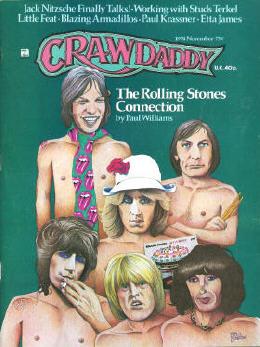
I am very pleased to have found a copy of this magazine. From the cover blurb I was expecting a page or less of Jack actually talking. But "Jack Nitzsche Finally Talks", is what it says on the cover!
A seven page layout, the rather groovy drawings account for one and a half pages, the rest is Jack being interviewed by David Talbot and Barbara Zheutlin. Some small photos of him are included, one showing Jack actually smiling. Although, I guess he could just be baring his teeth at the interviewers!
Certainly, it is a much grumpier Mr. Nitzsche than the one who chatted with Frits Boer for Hitweek or Ken Barnes for Bomp. Jack's passion is what you get from this interview and he rails at everyone, no target being left unscathed. Here Jack shows his feelings, mainly anger at the injustice of the world order. A man who feels isolated and alone, determined to put everything right.
With hindsight we know he failed, but this interview
shows it wasn't due to his lack of feelings. A man who cared about his
art, honesty and truth. It could be argued he may have cared too deeply.
A latter day Don Quixote, railing about Neil Young, "His lyrics are
so dumb and pretentious"
, The Rolling Stones, "They just copped
out when they hit that peak",
he shakes head ruefully, "I
guess they got to where they were heading"
, record moguls, Hollywood's
power, etc, etc. The obvious frustration he must have felt explains his
use of drink and drugs but his 'soul laid bare' does explain some of the
passion and beauty evident in so much of his work. This interview followed
shortly after the rejection of his fifth solo LP by Warner Brothers, so
it's not that surprising he is a little 'down'.
Not the most cheery of reading, you tend to feel that David Talbot and Barbara Zheutlin resented the fact that despite being 'radical sympathizers', Jack Nitzsche was talking a language they did not understand or really want to be made to face. How could he be biting the hand that fed him? They are 'cool', digging their life, and here is Jack - a punk with attitude - making them feel uncomfortable. Not fair! There's something wrong with this guy, not us!: seems to be their attitude.
The interview was transcribed by Eric Charge and Ian Chapman, thanks guys. Click on the "Expecting to Fly" image to read it online. Unlike after reading Jack's chat to Ken Barnes and Fritz Boer, I doubt you'll feel like singing "Sunshine, Lollipops And Rainbows", but I hope it will touch your soul.
P.S. by Denny Bruce.
Jack was pretty drunk when he gave this interview. He had hepatitis when he was young, and his body did not handle alcohol consumption real well. He was living on a property in Bear Gulch, which was owned by Neil Young. At this time there had been some talks that maybe Jack was going to have to move. He did the interview, which was a mistake, and said way too much in his rambles.
He called me the next morning and said he really didn't remember too much of
what he said. I asked if they discussed his career (the idea for doing the
interview) and he answered by saying he seemed to talk about Neil a lot. As
that point he moaned as he started realizing some of the things he said. "I'm
going to call Neil now and warn him about what might be printed." He told me
later that Neil told him not to worry about it, but he started sensing WWIII
was just around the corner."
Denny Bruce

Crawdaddy is on the web, still under the editorship of Paul Williams.
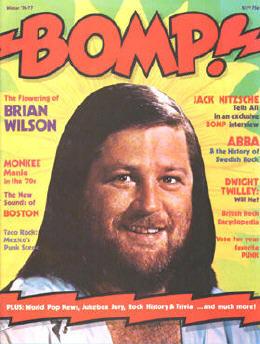
There is nothing like the real thing. Would you prefer a scratchy record
or pristine CD, a draught beer from the pump or a can of designer lager,
a picture of a girl or.....? I suppose it's my age but give me the dusty
45rpm, a pint in the pub and pictures? Who needs 'em!
But you can't always get what you want.
For the last 20-odd years I've had to make do with a photocopy of Bomp No.16. Until Mick Patrick lent me his copy for scanning. I never knew the first page of "The Arranger As Superman" article had a rather groovy purple washed picture of Jack. Some of you might have only heard about this article. For those of you, I do hope you enjoy this treat.
What is it about this piece of research that caused Mick Patrick, from deep inside the Phil Spector Appreciation Society building (when Bomp was no longer being published), to post Xerox copies to anyone who expressed an interest? Why would Brian Chidester cruise the streets with copies, to press into the hands of hopeful converts, like some latter-day St. John the Baptist? Finally, now's your chance to read or re-read the article and find out what the fuss was about.
To scan the pages would have resulted in images that could take an age to download, so I've attempted to keep the webpages as close to the original layout of the magazine as possible. The typing was carried out by the two fingered maestro Eric Charge, who for weeks refused to leave his room until the job was finished. Thank you for your kindness, Eric.
Enter Jack Nitzsche's Magical Musical World via "The Arranger As Superman" courtesy of Greg Shaw, Bomp and Ken Barnes, who (isn't it great) are still keeping the faith!

For the full history and, currently hectic, activities of Greg Shaw's musical baby.
The site contains loads of new and retro music for your listening and reading pleasure.
Greg Shaw (1949 - 2004)
When I extend my appreciation of Jack Nitzsche's work beyond a discography the first item on my wish list was to include the BOMP! interview. Unaware at the time that back issues of BOMP! #16 were still on sale I wrote to Greg Shaw and asked his permission to reprint the interview for the site, he willingly agreed. Furthermore he offered advice on the layout of the site, linked to the web piece from his BOMP! magazine history page, was very supportive and only too pleased to assist in any way he could.
His infectious enthusiasm and love of music, particularly music that was on the edge of the mainstream, helped fire my own passion, cool to find it was matched by his kindness. The BOMP! site has a page, The Facts about Greg Shaw that reveals much more about the man.
He will be sadly missed.
Martin Roberts

Good title for this interview taped in the U.S. by Joel Selvin for UK music weekly Melody Maker, "Nitzsche: the Sorcerer's Apprentice". Despite Jack being distracted, apparently he was missing his girlfriend Carrie Snodgrass, some interesting snippets emerge.
The interview was recorded shortly before Nitzsche flew off to record Graham Parker's new album, released as "Squeezing Out Sparks". Jack joked that he was "was mostly doing this album to go to London." He did however go on to praise the new songs he'd heard, particularly one of my favourites "Passion Is No Easy Word".
Intro'd with the usual roll call of Nitzsche's achievements; arranged many of Phil Spector's hits, (although Selvin wrongly notes that Jack didn't work for the producer after The Ronettes), Rolling Stones, Neil Young etc etc. The piece concentrates on Jack's recent work, mainly as producer for Capitol Records with mentions of his albums for Alan Gordon, The Neville Brothers & Michelle Phillips, new film scores for "Blue Collar", "The Hot Spot" and "When Ya Comin' Back Red Ryder" and tantalisingly an unreleased LP by David Foreman for Arista Records and plans for his new solo album (not released until Rhino HandMade's excellent CD release) and an LP by Ron Nagle and his partner Scott Matthews as The Durocs.
Anyway enough of my babbling click on the page scan to the right and give it a read.
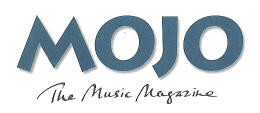




When Karel Beer was preparing to re-release Jack Nitzsche's "St. Giles Cripplegate" LP he threw out a challenge to the Rock-Press intelligentsia, "Jack Nitzsche is ready and willing to answer your questions". At first he thought his words had fallen on fallow ground. However, Sylvie Simmons answered the call to pens. She interviewed Jack at his house on June 24 1981. At the time she was the LA correspondent for UK rock weekly, "Sounds" with a regular column, "Hollywood Highs" and writing for glam metal, "Kerrang!"
Sylvie's work was also printed around the world with articles appearing in Japan for 'Sunshine' and 'Music Life' and in Germany for 'Musik Express/Sounds' amongst many others. Finding a published source for this interview has proved difficult. It is quite likely that an edited version was used but a source for this has not yet been found.
Sylvie's writing is honest and amusing her no-bullshit, drolly-sardonic approach is reflected in this interview. Jack for his part seems to wish he were elsewhere! This early coldness rapidly thaws though. Sylvie comments that, "I did warm to Jack - fairly quickly as it happens. In my memory he was quite curt and cynical, almost unfriendly, when I arrived at his house and when we began the interview. Unlike most people with an album to promote, he seemed to barely want to talk about it, or have anything to do with it at all. But my overall memory of him is as being cantankerously charming. I can see why Neil Young, another cantankerous charmer, liked him."
With questions such as, "If you were that idealistic, why let the album die - why not go out and flog it yourself on street corners?" and "So You're The Yoko Ono of Buffalo Springfield!" the interview was never going to be a casual stroll in the park. Jack soon realises that he's going to have to answer the pesky woman's questions and that they deserve to be answered. The interview starting with St. Giles but progressing forwards and backwards covers most of the major musical events in Jack's career. His frankness is evident as he answers Sylvie's probing on working and meeting Phil Spector, his then current relationship with Capitol Records, playing live with Neil Young, living in the 'land of the free' and more. Sylvie's writing is never boring and this interview is essential reading.
Besides a propensity for wearing cowboy hats and other writers fondness for attaching the tag 'Americana' whenever Sylvie's name is mentioned her USA adventures seem to have left her unscathed. A prolific writer she is currently MOJO's Contributing Editor writes on music for The Guardian, penned a biography of Neil Young, "Reflections In Broken Glass" wrote the favorably reviewed life story of Serge Gainsbourg, "A Fistful Of Gitanes", penned the sleeve notes for Johnny Cash's critically acclaimed 'Unearthed' CD retrospective, is now writing the biography, (at the request of Rick Rubin, Johnny's record producer) of Mr. Cash's last ten years. An interview with Sylvie by the web site, Get Ready To Rock, Backstage Heroes is well worth reading. Her latest book "Too Weird For Ziggy" has recently been published by Grove Atlantic. A seemingly accurate (although I hope slightly exaggerated!) description of the 'rock gods' and minnows that orbit them it's very funny, a bit scary, but above all a compassionate collection of short stories. Strongly recommended.
Despite her very busy schedule she not only made the interview available for the site but also made the time to pass on extra info and review progress. Thanks Sylvie.

Invite Sylvie Simmons into your living room. It's new, it's hot, it's in technicolor, it's Sylvie Simmons with her very own website. Have a wander, ask a question AND sign her guest book. Sylvie Simmons on the web
Photos of Jack Nitzsche were taken to accompany the interview; photographer Chris Walter contacted the site and has kindly agreed to these being featured, where they were intended, alongside Sylvie's interview. The shots were taken at Jacks home and despite '81 being a rather difficult year they capture him looking remarkably relaxed.

Chris Walter started taking photos of his pop heroes privately in the early 60s, it soon turned into a full time career. Many examples of his work can be found and licensed for commercial use on his web site, Photofeatures International. The breadth of artists covered is quite overwhelming. From his first 'commercial' shot of Little Richard performing at the Granada in Tooting Broadway, Chris seems to have photographed almost every artist of note. For anyone interested in the visual history of rock'n'roll the site is a required visit. As with Sylvie Simmons interview the photographs are used with permission and the copyright belongs to, Chris Walter.
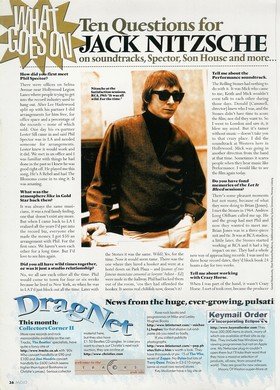
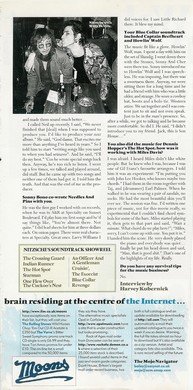

Published approximatly in the mid-late 90's I'm afraid the actual dates for these MOJO interviews with Jack Nitzsche have been lost but lots to enjoy.
Click on the small images for the full sized scans.
Harvey Kubernik used some, but not all, of "Ten Questions for..." in his book "This Is Rebel Music" it makes for a great read.
Ben Edmonds interview "What Makes A Great 45?" quizzes Jack on the role of the arranger in popular music. He awards 'An unexpected bouquet' to "Drive" by The Cars and picks nine other favourite tracks, a fascinating although frustratingly short read.
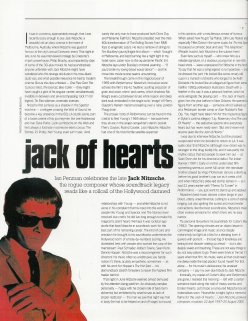
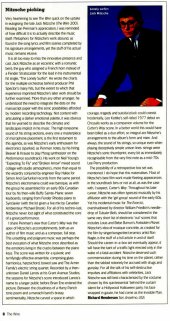
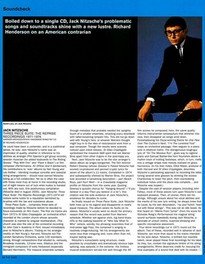
How unusual, a music magazine that has been published continually for over fifteen years and doesn't think its readers are only interested in dancing & shagging. Not to say you don't get a fair amount of salsoun & rock 'n' roll mixed in with the intellectual treaties on electronic composer Maryanne Amacher or a dissection of Herb Albert's "Whipped Cream & Other Delights" LP cover that doesn't include the term, "nice tits". This is a magazine for those who are not happy staying in the comfort zone of the music they know and love but adventure's constantly looking for new music to ding their dongs. The standard of writing and knowledge of the journalists for their subjects is infectious but I confess whilst I'm still discovering old/new music I'm happy where I am. And even for old stick in the mud's Wire has much to offer, with a healthy respect for the music of yore.

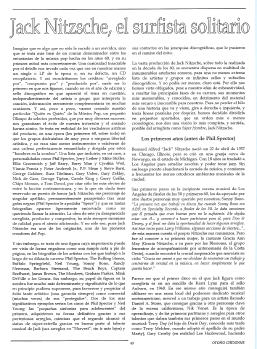
When Iñaki Orbezua contacted me and mentioned his Spanish fanzine Otoño Cheyenne (Cheyenne Autumn in English), I was very interested. After 'chatting' to him and feeling his enthusiasm for the music we love, I was excited.
The 'zine arrived and WOW! A look at the cover was enough to get me hurrying to open the pages. A marvellous 'read'; The Jack Nitzsche article, written by Iñaki is (until we have Jimmy McDonough's Jack Nitzsche autobiography) the most complete review of Jack's musical life to be published.
Marvellous but a trifle frustrasting... all of the article is in Spanish! Not that hard to follow the story though. There are plenty of record titles, work colleagues and places to give you an understanding of where you are in Jack's life. Thirteen A4 pages (with a few pictures) are devoted to telling the tale.
This is issue #5, it also features interviews and articles } in English with Dwight Twilley, David Bash (I.P.O. festival organizer), Steve Wynn, Kim Williams, The Orgone Box, Adam Schmitt, Willie Nile, The Kinks, (some of the) Best Albums of 2001, Record & 'Zine Reviews, plus an added bonus: a Left Banke special, with interviews with Tom Finn (original band member), Tom Feher (Michael Brown writing partner), Erik Lindgren and Les Fradkin. The remaining contents are articles in Spanish about Randy Newman, Van Dyke Parks, Burgas Beat, Dion Dimucci, and Richard & Linda Thompson. Issue #4 (A5 size), features amongst many others, writings on Ellie Greenwich, Jackie DeShannon, Anders & Poncia, Andy Paley and even - turning the tables - an interview with Stephen McParland!
Iñaki Orbezua has now put Otoño Cheyenne on the web.
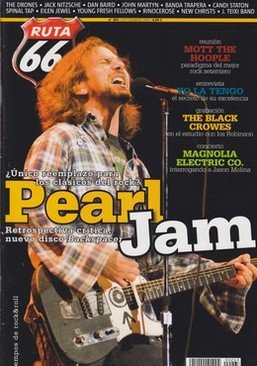
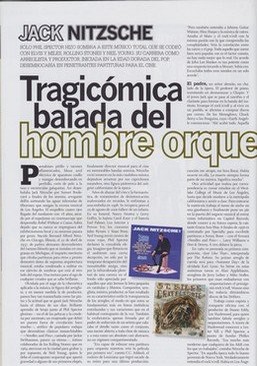
First Part of Nitzsche article
Second Part of Nitzsche article
Third Part of Nitzsche article
I'm pleased to add "Ruta 66" to Nitzsche's Magazine page, three A4 colour pages in a current music mag, devoted to the work of Jack Nitzsche, Olé!'
Friend Iñaki Orbezua gave me my copy and added a short intro:
"Ruta 66 is one of the two leading rock magazines here in Spain, and the author of the article on Jack Nitzsche, Ignacio Julia, is one of the editors. The piece itself is a general overview of his musical career."
Iñaki has been promoting concerts in Bilbao, including Jack Nitzsche related artists Bob Lind ("He did an amazing show, and even though some of the audience didn't fully understand his lyrics or comments he just put his heart in his music and the message got through... quite magical!!!") and Phil Sloan ("That was magical, too.").






